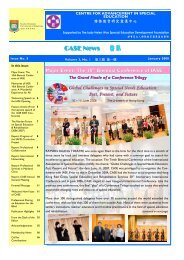Do Secondary L2 Writers Benefit from Peer Comments?
Do Secondary L2 Writers Benefit from Peer Comments?
Do Secondary L2 Writers Benefit from Peer Comments?
Create successful ePaper yourself
Turn your PDF publications into a flip-book with our unique Google optimized e-Paper software.
162 TSUI AND NG<br />
I will wonder whether my classmates understand what I write or not. If they don't<br />
understand they have to spend more time reading my composition. So I read my<br />
composition a few times more. Before writing a sentence I will think once again<br />
whether to write it or not and whether there are any mistakes. ...They reminded me<br />
not to be too subjective when writing compositions and think that others would be<br />
able to understand me.<br />
Interestingly, Patrick gained his sense of audience only through writing for<br />
his peers to read, not <strong>from</strong> his teacher. He pointed out that if his writing were<br />
read by the teacher only, then he would not have been as audience conscious.<br />
He said, ``Because I think the teacher should be used to reading students'<br />
compositions and should manage to understand them. ... I think it is in fact<br />
reading each other's composition that is of much use.'' To Patrick, the teacher<br />
should be able to work out his intended meanings because she was an<br />
experienced reader of students' compositions. It was writing for peers that<br />
heightened his sense of audience.<br />
Apart <strong>from</strong> a sense of audience, peer comments as well as the peer response<br />
sessions helped to foster a sense of ownership of text. Patrick said that upon<br />
reading the comments, he would discuss them with his peers (in the peer response<br />
sessions) and then make his own decision about whether to make the revisions or<br />
not. ``I read all the comments first and think whether all the comments need to be<br />
considered. ...I will ask my peers how this part is inadequate. They then give me<br />
comments. I will listen and think it over again before deciding whether I will add<br />
some points or not in my revision.'' In other words, he, the writer, is the one to<br />
make the final decision about his own text and not the reader. Similarly, Vanessa<br />
incorporated peer comments into her compositions only when she agreed with her<br />
peers; otherwise, she would ignore the comments.<br />
Another benefit of getting peer comments, to Patrick, is that it encouraged the<br />
students to learn <strong>from</strong> each other. He said, ``You can treat the peers as your<br />
teacher, they can teach you things and help you.'' Even for weaker students, he<br />
could benefit <strong>from</strong> working with them. He observed, ``If a peer is weaker in<br />
English, then it may be I who help others ...He may know something I don't and<br />
I may also know something he doesn't ...He can spot it and tell me. Maybe we<br />
can't spot as many problems but there is still some use.''<br />
Patrick saw a great deal of merit in getting peer comments. However, he also<br />
felt that teacher comments served roles that peer comments could not. One<br />
important role mentioned was inducing ``macro-text-based'' changes (Connor &<br />
Asenavage, 1994, p. 262) that refer to changes at the macro level of the text such<br />
as the reorganization of chunks of text and a change in the direction of the idea<br />
presented. According to them, such changes could not be induced by peer<br />
comments. Patrick pointed out that peers could only respond to what was written<br />
and provide feedback on whether the points were relevant or whether they needed<br />
elaboration. However, they could not suggest a better organization. He commented<br />
as follows: ``<strong>Peer</strong> comments won't ... help me to organize the points. They

















